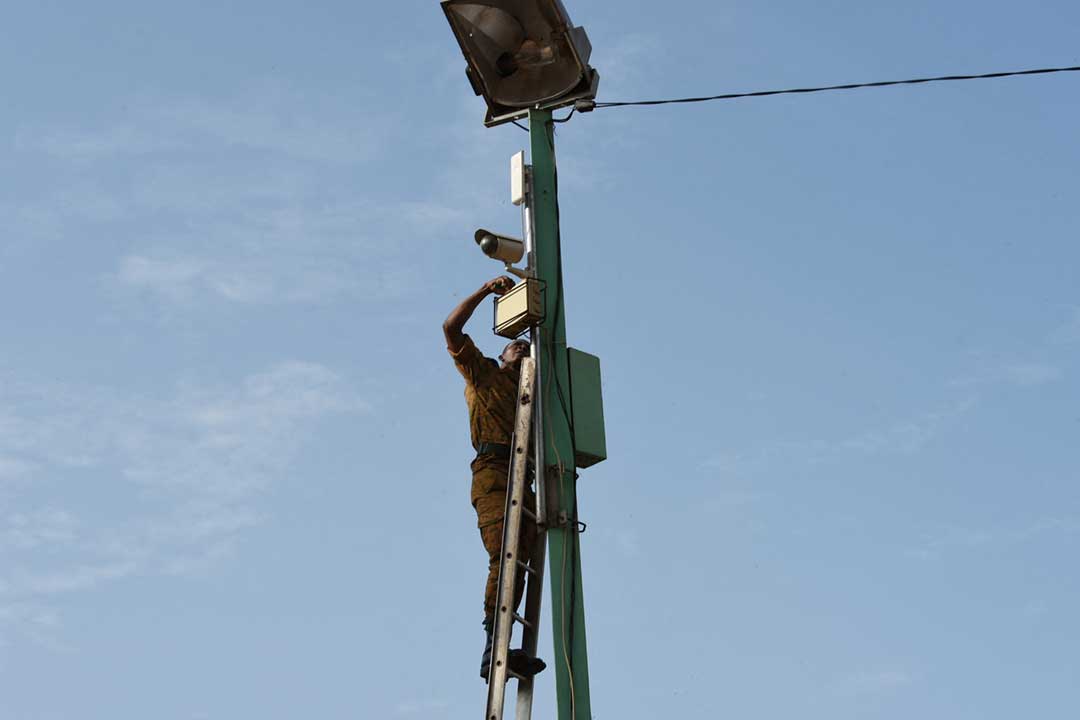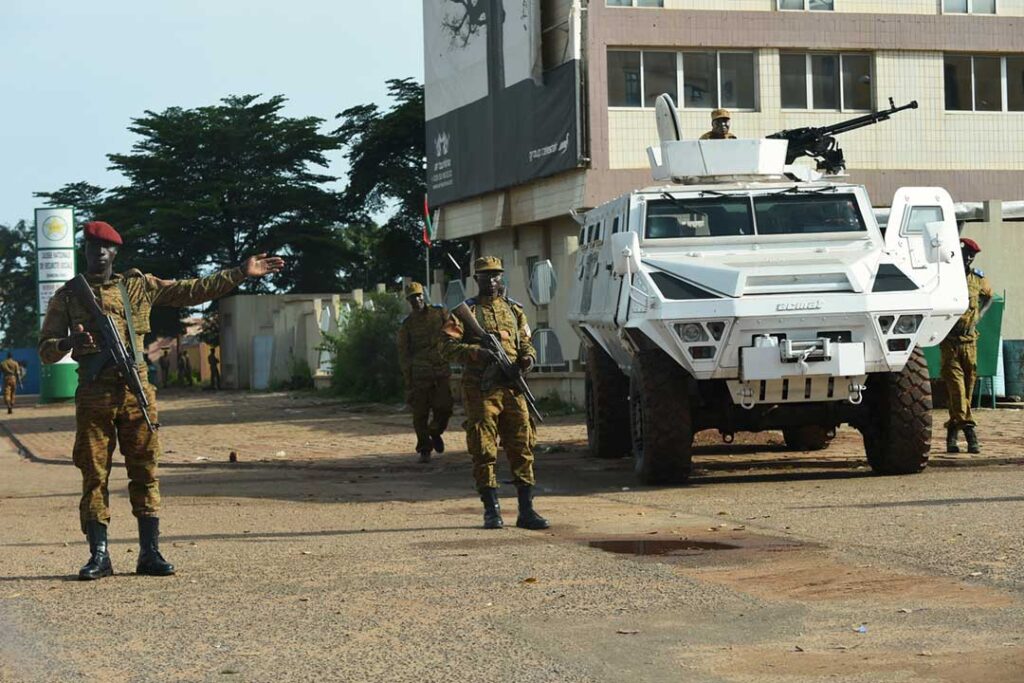Military takeovers in Africa
When will the AU bare its teeth?
It was late 1987 when Blaise Compaoré became president of Burkina Faso in a coup d’état. Michael Jackson was atop the charts with his album “Bad” and the Berlin Wall would stand for another two years. Twenty-seven years later, Mr Compaoré lost power the same way he had taken it. Burkina Faso’s military hijacked a wave of popular protest and toppled the long-time strongman from his Ouagadougou throne on November 1st 2014. Mr Compaoré’s convoy of tinted-window sport-utility vehicles snaked south-west to Côte d’Ivoire, following the path to exile trampled by so many post-independence African leaders chased from office at the barrel of a gun. As news spread of the departure of “Beau Blaise”, as he was known, euphoric celebrations filled the streets. But in the blur of the following days’ hangover, another realisation set in: who had taken his place? Had Burkina Faso traded one bad government for a worse one? So long as the military remains in power—or the military at least retains the post of prime minister—the answer is yes.

Burkina Faso’s recent coup, like all illegal takeovers, is a disaster for the country. Zapping decades of dictatorship may appeal to Africans desperate for a lightning strike of political change after protracted stagnation. Unfortunately, the damage inflicted by a coup d’état in a single day almost always takes years, sometimes generations, to repair. The average putsch throws national economies into recession for three full years, according to coup expert and political scientist Jay Ulfelder, former director of the CIA’s Political Instability Task Force. On top of the drop in growth rates, illegal regime change often prompts international isolation, a severe drop in foreign investment, and the loss of international aid that is often crucial to funding social support programmes. Prior to Madagascar’s 2009 coup, for example, the government relied on international donors to cover 40% of its bills, according to its 2008 budget.
After the takeover, a coordinated isolation campaign yanked that money away from Madagascar—eliminating $4 out of every $10 from the government’s planned expenditures. The country faced total quarantine from the global stage—even though the military handed control back to a civilian (albeit unelected) almost immediately. The African Union also suspended Madagascar for almost five years. During that period essential donors such as the US and France cut off bilateral aid, and the World Bank closed its multilateral aid tap. The damage persists more than five years later, as Madagascar’s growth rate— above 7% in 2008, according to World Bank figures—has still not come close to its pre-coup levels, only reaching 2.1% in 2013. Madagascar is not alone on the continent. While governments are overthrown everywhere in the developing world, Africa is uniquely afflicted.
A coup d’état is an unconstitutional transfer of power originating from within the state, usually involving the military. This is in contrast to a rebellion or civil war, which involves groups of fighters that are distinctly outside the state apparatus. Between 1960 and 2013, 386 alleged, planned, failed and successful coups d’état disrupted the African continent—an average of more than seven per year, according to the Center for Systemic Peace, a non-profit think-tank based just outside Washington, DC. Power-hungry presidents have sometimes pointed to “alleged” and “planned” coups against their regimes as a pretext to crack down on internal opposition. For example, in 1991 Tunisia’s ruthless strongman, Zine el-Abidine Ben Ali, fabricated a plot by Islamists and a few hundred military officers that he viewed as major threats. He used the pretext of this conspiracy to jail and torture hundreds of men from both rival groups.
As a result, accurate counting of coups that includes “alleged” and “planned” attempts is problematic. Leaving aside these take-over attempts, in the 54 years since most of Africa became independent, 85 successful coups, including the recent one in Burkina Faso, have removed the ruling regime—an average of 1.6 per year since 1960. Moreover, the absolute numbers are high relative to other regions. The Center for Systemic Peace reports that Africa has been home to 53% of all coups d’état in the world—a distinctly disproportionate share. So we know that takeovers happen in Africa with alarming frequency. But have the trends changed over time? Throughout the first three decades of African independence, “successful” coups took place at almost metronomic intervals: 20 in the 1960s, 19 in the 1970s and 20 in the 1980s. During the wave of democratisation in the 1990s, fewer governments (14) were overthrown, but military takeovers still persisted as a common way for regimes in Africa to rise to power.
Illegal takeovers have declined in the new millennium with just seven “successful” coups. But they may be making a comeback as militaries have taken over five governments in sub-Saharan Africa since 2010: Burkina Faso in 2014; Egypt, 2013; Guinea-Bissau, 2012; Mali, 2012; and Niger, 2010. In addition to these clear-cut examples, the Arab spring’s unconstitutional transfers of power demonstrate the sometimes murky distinctions between coups and revolutions. The 2011 transfer of power in Egypt is rarely called a coup, but this classification is debatable because Egypt’s military retained de facto authority. The Libyan case is far clearer and was certainly not a coup. The regime was toppled by outside intervention and a series of militias that were not part of the state apparatus. Regardless of their frequency or how they are counted, one major change has made it less tempting for soldiers to seize power in Africa: the international community, at the urging of the African Union, is taking a much firmer stance against regimes that arrive in power by unconstitutional means.
Until 1997 the Organisation of African Unity (OAU) had a policy of non-interference in the affairs of member states. After all, long-standing incumbents had written the rules and were not eager to have a supranational body dictate their internal affairs. That precedent began to change when the army deposed the president of Sierra Leone in May 1997. The OAU’s secretary-general, Salim Ahmed Salim, condemned the coup and demanded that the international community repudiate the subsequent government. They did: Nigerian troops of the west African intervention force, Ecomog, drove out the rebels and paved the way for the reinstatement of the deposed president, with about 100 casualties, according to press reports. Three years later, the continent’s leaders signed the Constitutive Act of the African Union—a replacement for the Organisation of African Unity. The Act’s article 30 censures illegal takeovers and establishes that “Governments which shall come to power through unconstitutional means shall not be allowed to participate in the activities of the Union.”
This was a major change from the previous policy of non-intervention. It compelled the African Union to suspend the memberships of Madagascar (2009), Mali (2012), Egypt (2013) and the Central African Republic (2013, still in effect), owing to their unconstitutional transfers of power. A strict reading of the African Union’s article 30 should have led to the suspension of Egypt, Libya and Tunisia in 2011 as the new governments were certainly not put in place using constitutional means. But, if they had been barred, these countries would have each earned reinstatement (at least initially) by their attempts to hold elections. Coup leaders can now be certain of the immediate costs: perpetrating a coup is a nearly sure-fire way to lose membership in the club of African states (though alarmingly, Burkina Faso and its coup leader and new prime minister, Yacouba Isaac Zida, a lieutenant-colonel, seem to be getting away with it).
Worse, it also is likely to lead to a complete loss of bilateral assistance and international recognition (again, Burkina Faso may be a troubling exception). The spoils of many African governments are still alluring but that attraction is diminished when aid dollars are shut off completely and diplomatic ties are severed. As a result, the battlefield in the aftermath of coups has now changed; it is no longer about securing non-intervention after unconstitutional takeovers. Instead, African leaders that seize power illegally are now playing a branding game, trying to label their palace revolutions as “popular insurrections” aiming to “restore democracy” rather than military takeovers. This tendency is as old as African coups themselves. As Ruth First, a South African coup scholar, put it in 1970, “It is as though, in the army books and regulations by which the soldiers were drilled, there is an entry: Coups, justifications for; and beside it, the felicitous phrases that coup-makers repeat by rote.”
But at least back then, everyone knew it was a farce and did not take the coup justifications seriously. That marketing was on display in Burkina Faso in November 2014 when soldiers deposed a civilian leader who had won four disputed elections. They welcomed the protestors’ labelling the event the “Black spring”, hoping to attract the goodwill that was generated by the Arab spring. Tens of thousands of people had taken to the streets calling for the ousting of Mr Compaoré. But as soon as the military deposed a civilian and made a soldier the prime minister, the event became a textbook coup. Now, they are trying to package it as a “civilian transition”. A man in uniform, however, would not be guiding a genuine civilian changeover. Therein lies the paradox: many people in Burkina Faso may be elated at the demise of the Compaoré regime, just as many people in Egypt were recently delighted to see General Abdel Fattah al-Sisi and the Egyptian military overthrow Muhammad Morsi in 2013.
But both events were steps backward, not forward. On a continent that has been rife with military takeovers since independence, the time has come to intensify, not lessen, the pressure on regimes that seize power in unconstitutional ways. The African Union threatened Burkina Faso with suspension if it did not return to civilian rule swiftly, but backed off when the military agreed to cede power to a civilian-led transition. That is too lenient. This regime change is unconstitutional and contravenes article 30, which binds the AU to immediately suspend Burkina Faso until it holds fresh elections. This “civilian transition” is a sham. If the AU wants to stop coups it must respect its own rules, which deem military takeovers unacceptable transgressions, even if the deposed government was unpopular. Until the African Union proves it has teeth, military takeovers will persist on the continent. Soldiers were once tantalised by coups that propelled them to power without any negative consequences.
Today, despite more penalties, soldiers are still tempted. Why? Because as in Burkina Faso, the AU is looking the other way. If unconstitutional takeovers are to be made aberrations of the past, armies that depose governments must face isolation, sanctions and loss of aid until clean and fair elections are held. In Burkina Faso, that message has been lost and the African Union has been duped.




